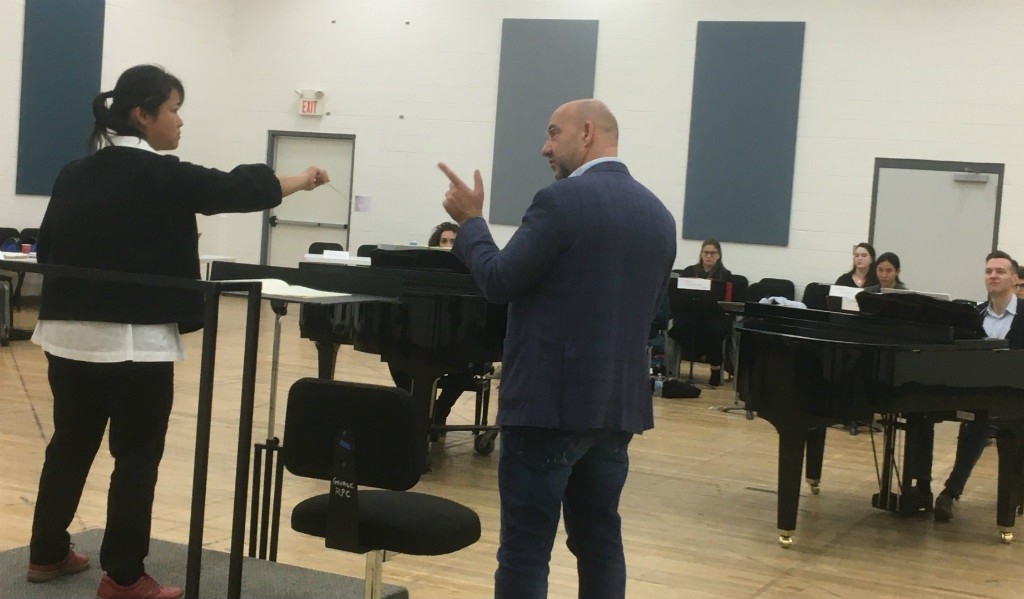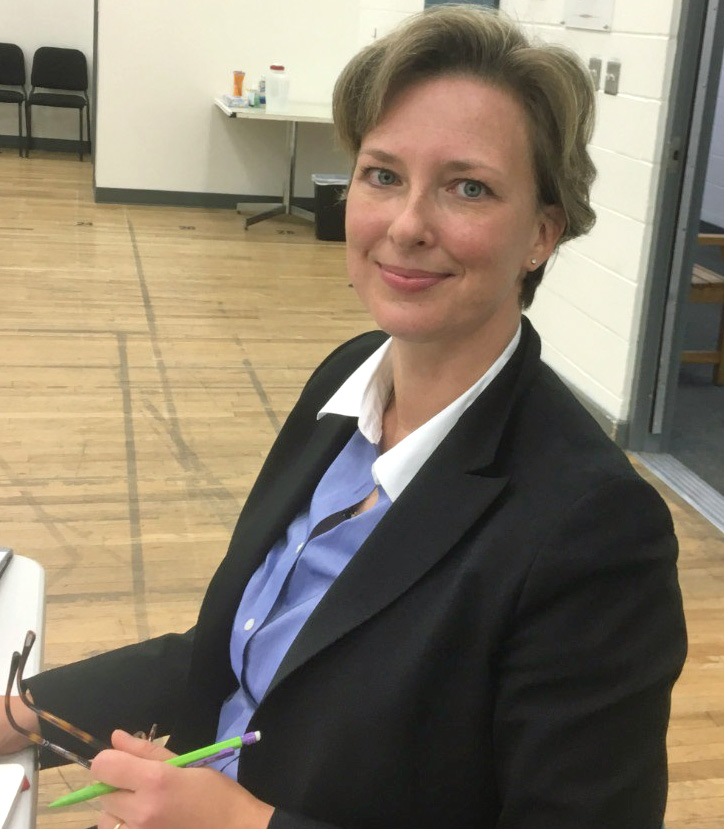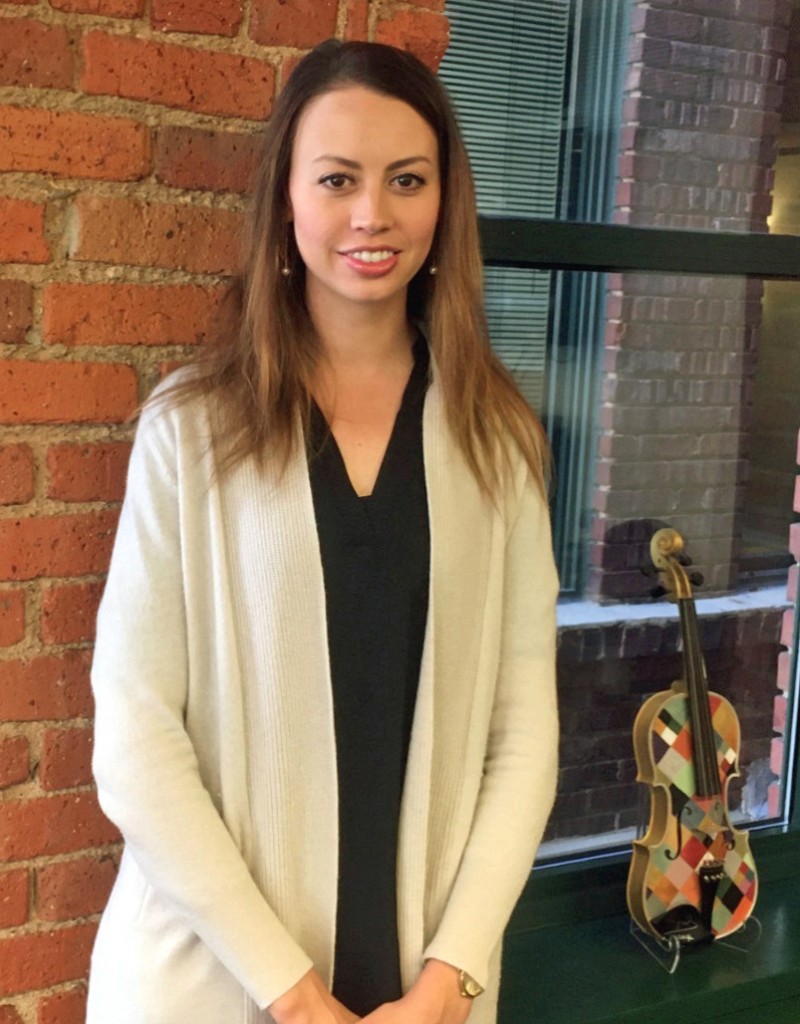Dallas Becoming A Force For Women In Classical Music
ArtandSeek.net October 31, 2019 68There are signs that Dallas is becoming an international center for women seeking gender equity in classical music. The Dallas Opera’s Linda and Mitch Hart Institute for Women Conductors is in its fifth year, and women from around the world are in town to attend. Next week, the Dallas Symphony Orchestra holds its first symposium for women in classical music. In the Art&Seek Spotlight, KERA’s Bill Zeeble learns these opportunities are making a real difference.
It’s the first full day of the Dallas Opera’s Hart Institute for Women Conductors. Madeline Tsai, from Taiwan, leads two pianists in an opera overture as Dallas Opera music director Emmanuel Villaume watches, ready to offer criticism and advice.

Madeline Tsai conducts a Mozart overture as Dallas Opera’s Music Director Emmanuel Villaume looks on. All photos by KERA’s Bill Zeeble.
“Good, very nice very nice. Ok.” Villaume says as he stops her then asks why she interpreted a musical passage a certain way.
For the next two weeks, Tsai, five other conductors and three observers will undergo stressful masterclasses along with lessons in just about everything else – like managing board members, employees, their own social media – to understanding orchestra budgets.
To get here, every participant, including Tsai, competed against at least 100 international applicants.
“I actually have a lot of stuff to show to the world,” Tsai says, “and my mission is very strong to the life. But I just had no place to go.”
Tsai, who applied this year after failing to get in last year, tears up. This is so personal for her. She then presses on.
“I see how difficult we as a female wanted to share our passion in life through music to the world but we got stopped. Or got forbidden,” Tsai says.

Elizabeth Askren, opera conductor, teacher and graduate of the 2nd Hart Institute.
Not here. The Hart Institute – launched just four years ago – delivers.
“This really is the program of reference. It is the one to watch,” says Elizabeth Askren, an up and coming opera conductor and teacher.
She also graduated from the Hart Institute in its 2nd year. Today she directs opera in Romania and teaches in France thanks in part to this institute. And she’s teaching here for the next two weeks.
“Everybody has heard of it now,” Askren says of the Hart Institute. “In Europe, in Asia, in the Americas. Dallas Opera and the Hart Institute. I mean that’s the place where young talented and motivated female conductors are looking.”
When looking for a keynote speaker, the Hart Institute sought another graduate, Stephanie Rhodes Russell. Now a Conducting Fellow at the Fort Worth Symphony Orchestra.

Stephanie Rhodes Russell stands in an office where she now works – the Fort Worth Symphony Orchestra where she is a Conducting Fellow. In 2015, she participated in the first Dallas Opera Hart Institute for Women Conductors.
“The Hart Institute gave me a network of women that were in similar positions as I was,” says Russell. “And being able to support each other through career transitions, to turn to each other for connections and advice, was invaluable.”
That network of teachers, fellow participants, mentors and Dallas Opera staff make up the sauce that alums say spell success for them once they leave here. They’ll need that help because recent research shows only five women are among the busiest 100 conductors in the world. Still, that’s better than six years ago when only one in the ‘busy 100’ was female.
The Hart Institute’s network helps graduates increase those odds by identifying jobs, offering a shoulder to lean on, and providing references.
“When we vouch for them, people also are starting to listen a little more,” according to David Lomeli, the Dallas Opera’s Director of Artistic Administration. He recently raised the standard for Hart Institute applicants, insisting they sing some opera part while simultaneously conducting. It’s not about their voice quality.
“We just want to know if you have a professional reading with an orchestra, you can sing the parts because as you know, it’s part of the rehearsal,” Lomeli says.
As a result, there have been fewer applicants but they are better qualified. The institute’s also caught the attention of the Dallas Opera’s next-door neighbor, the Dallas Symphony Orchestra.
For the first time, the symphony launches its annual Women In Classical Music, a 4-day symposium beginning November 6. Scheduled to overlap with the opera’s institute, the symposium’s schedule of talks and concerts is open to the public, unlike most opera institute sessions. Ticketed topics include Self-Entrepreneurship for Musicians and Career Development for Musicians and Administrators. Symphony CEO Kim Noltemi’s behind it all.
“We have had 300 years of men leading orchestras and women not having a pathway,” Noltemi says, “not because they weren’t interested but because the structure existed that men would give jobs to their good friends who were men.”
That structure still mostly exists, says Noltemi, just no longer at the Dallas Symphony. The organization’s assistant conductors and resident composers will now be women.
“It’s our job to talk about it and to help other people,” Noltemi says. “If I’m not going to do it who’s going to do it?”
No one objected, says Noltemi. Not the incoming music director or orchestra members. Noltemi was pleasantly surprised to learn the DSO has for years claimed a higher percentage of women musicians than most orchestras. Today, she says it stands at 45%.
The DSO and the Dallas Opera call their symposium and institute a win-win for women and the public. Both organizations also will present different concerts to anyone who buys a ticket.










